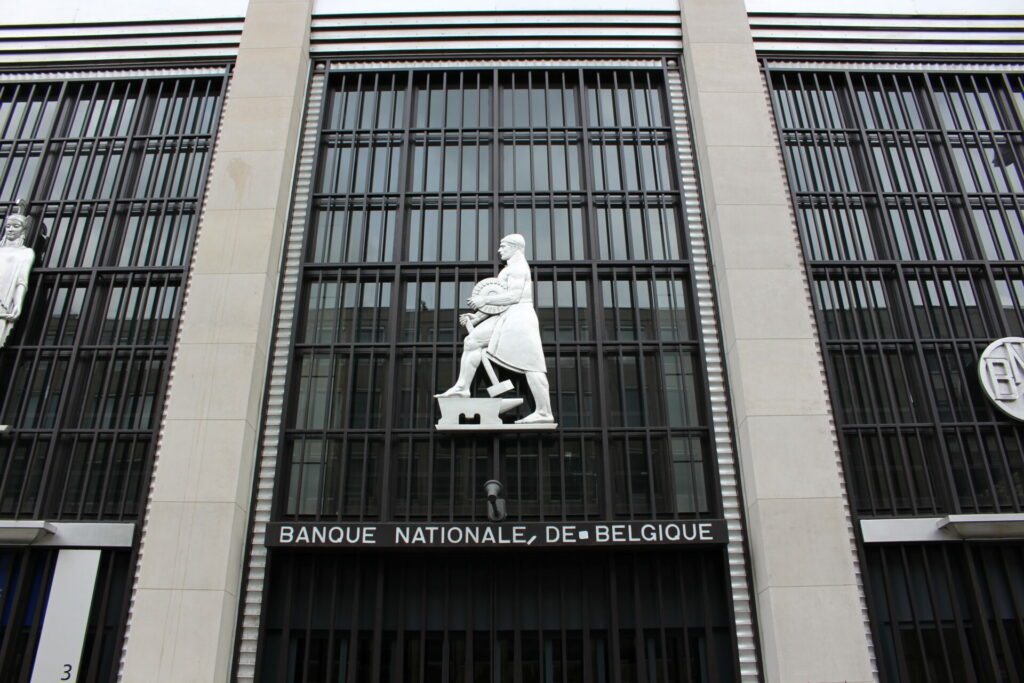The National Bank of Belgium (BNB) is set to record its first loss since World War Two and has predicted that by 2027 it will be forced to assume a "negative capital position", i.e. its liabilities will exceed its assets.
In a market notice published on Tuesday evening, the BNB stated that it "expects to close the current financial year with a loss, estimated in the range of €600 million to €800 million". It further noted that, to cope with the loss, its current financial reserves of €7.08 billion "will have to be utilised for the first time at the end of this financial year".
Ominously, these reserves are less than the BNB's anticipated losses up to and including the financial year of 2027, which are set to exceed €9 billion. Should its predictions be borne out, the BNB would be forced to operate with a negative capital position — a possibility that the bank claims it would be able to endure "at least temporarily".
"Even if the Bank's financial buffers were to be depleted over the course of the coming years, this would not call into question its stability," the BNB notice states. "After all, a central bank can continue to operate, at least temporarily, with a negative capital position."
A precarious situation
Some central banks – including those of Chile, Slovakia, Sweden, and Switzerland – have operated with a negative capital position in recent years, but the dangers of doing so, particularly in Belgium's case, are immense.
According to the IMF, a negative capital position "not only limits central bank independence", but also has the potential to have "an expansionary effect on the money supply with a deleterious effect on the efficacy of central bank monetary or exchange rate policy." It therefore recommends that "a central bank needs to maintain a risk-based level of capital adequacy, which at a minimum should be non-negative."
Moreover, a recent report by De Nederlandsche Bank found that the central banks which typically operate unproblematically with a negative capital position do so "because stakeholders such as financial markets and the public have trust in the government and the strength of the national economy".
However, even relative to the poorly performing economies of the other EU Member States, Belgium's national economy can hardly be said to be doing well: its inflation rate of 10.6% remains higher than the eurozone average, while the country's Federal Government is set to run the EU's joint-highest fiscal deficit next year — a fact which has even resulted in explicit condemnation by the European Union.
The source of sorrow
The BNB claims that the primary reason for its losses is the recent spate of interest rate increases introduced by the European Central Bank (ECB) in its efforts to curb rampant inflation throughout the eurozone area. Since July, the ECB has increased interest rates from -0.5% to 1.5% — meaning that the BNB, rather than being paid by depositors who park their funds in the bank, now has to pay out rates of 1.5%.
Related News
- European Central Bank raises interest rates at fastest pace on record
- European Commission condemns Belgian public spending
Indeed, according to the BNB, "the sensitivity of the Bank's costs to such interest rate increases is linear", insofar as "an increase in ECB policy rates of 25 basis points [i.e. 0.25%] raises the Bank's costs by around €310 million on an annual basis". Worryingly for the BNB, the ECB has made it explicitly clear that further interest rate hikes — and, hence, additional costs for the BNB — are just around the corner.
"We still have a way to go and we're not done with inflation so, yes, we will continue to raise interest rates," the ECB President Christine Lagarde said at the end of November.

